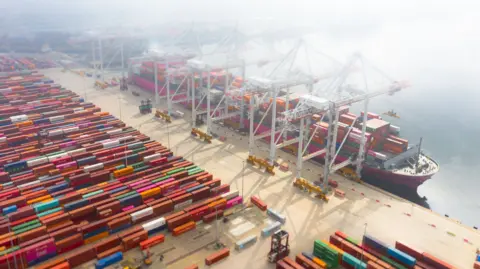
 Getty Images
Getty ImagesEuropean retailers are rushing to place their Christmas orders early as soaring shipping costs and trade route disruption threaten holiday deliveries, experts say.
For the last few months, vessels belonging to Western firms have been attacked in the Red Sea by Houthi rebels backing Hamas in its war with Israel, driving shipping prices up.
Container prices, which peaked in January and briefly declined, have rebounded sharply in recent weeks.
One business told the BBC that increased costs were likely to feed through to the price of big-ticket items such as white goods.
Nick Glynn, boss of the Buy It Direct group, owns several online retailers including Appliances Direct and Laptops Direct, which are having to plan and book well in advance to make sure their shipments arrive on time.
Because they are planning ahead, he said he didn’t think Black Friday and Christmas stock would be affected.
But he said: “It impacts cash and warehouse space as suddenly you have to store the goods for longer. You can’t risk ordering later.”
Mr Glynn explained that the spot rate – the current price for immediate delivery of goods – has dramatically increased in recent weeks from $4,500 to $7,500 (£3,500 to £5,900).
“This makes a massive impact on big bulky items, especially those that have low margins such as furniture, barbecues, and kitchen appliances,” he said.
There was “no way” most online retailers could absorb those price increases on big-ticket items, he said.
“So unfortunately for consumers, the next few months will see significant rises on these big-ticket items,” he added.
Pandemic lessons
Disruptions caused by Yemen’s Houthi movement have limited the global supply of shipping space and containers.
The Houthi rebels have already launched attacks on more than 50 ships in the Red Sea and the Gulf of Aden.
 Getty Images
Getty ImagesShipping costs have soared as a result. The average cost of shipping a 40ft container now exceeds $4,000, a 140% increase from 2023, according to freight market tracker Xeneta.
Peter Sand, Xeneta’s chief analyst, said that importers have learned many lessons from the pandemic including that “the most straightforward way to protect supply chains is to ship as many of your goods as you can as quickly as possible”.
“That is what we are seeing with some businesses telling us they are already shipping cargo for the Christmas period – in May,” he said.
Typically, retailers start importing goods for the November Black Friday sales and Christmas shopping season between late summer and autumn.
Sue Terpilowski, from the Chartered Institute of Logistics and Transport, agreed, saying companies are realising that disruption to the Red Sea route caused by Houthi attacks could last until the autumn.
“To avoid headlines ‘Christmas is cancelled, there’s nothing in the shops’, people are now actually bringing forward their shipments,” she said. “So they’ll be here in good time allowing any eventualities that might happen while they are at sea.”
Diversions
The attacks on ships have forced owners of vessels travelling between Asia and Europe to take a longer route around Africa, and so ships are starting their journeys earlier to allow for the extra time needed for the diversion.
“The effects of the diversions from the Red Sea that started last December are only now becoming apparent, with vessels on the Asia-Europe trade needing more than 100 days on a rotation by circumventing Africa,” said Dominique Nadelhofer, from Kuehne + Nagel, a major sea logistics firm.
He added that the rotation of container equipment has also been disrupted, and said only around 50% of global container shipping is currently completed on time.
As well as concerns about potential future Houthi attacks, there are also growing fears that as naval forces focus on countering the Houthi rebels, the resulting reduction in maritime patrols elsewhere may provide Somali pirates with opportunities to increase their activities.



Be the first to comment